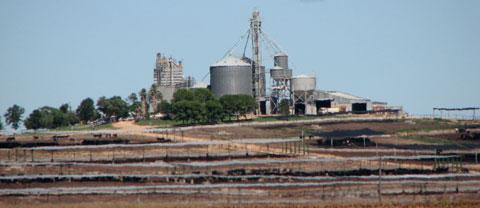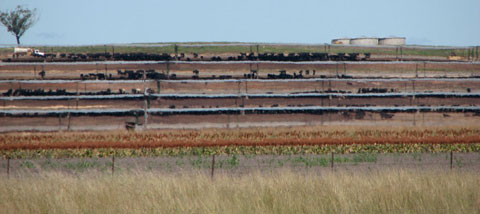Those of you who have read my first book, The Woman on the Mountain, will know I’m a vegetarian. That is just my personal choice: I don’t want to kill another creature, or cause any to be killed for me by others, therefore I won’t eat any. Nor have I, for 36 years now.
Many people aiming at self-sufficiency are not vegetarian, and keep their own chooks or sheep or pigs or cows or whatever they intend to eat – some with small yards are breeding guinea pigs, I read. But they know their animals, care for them, respect them. Those animals live the lives of their domesticated kind until the moment they are killed.
Not so in factory farming.

When I realised what I was driving past, I felt sick.
This is a feedlot, a production plant for cattle to become beef. Here cattle are fed the grain grown on the surrounding plains, watered and given shade. Perhaps they get other growth-helpers or medications, I don’t know.
But that’s all. Bare earth is their world; green is something beyond their confines; it does not signify grass, for that is foreign to them – either underfoot or in their mouths.

OK, while they fatten they aren’t penned too tight to move, like factory hens or pigs, but who would consider this is a ‘life’ for any creature?
To my mind it is merely a long pending death, perpetrated by the inhumanity of corporate greed, which sees these animals as mere production lines, beef-producing machines.
Surely nobody on their corporate boards can have had their fingers sucked clean of warm milk as they try to rear a poddy calf, or been followed about by a bleating, gambolling pet lamb who has inexplicably adopted you.
Feedlots are not the norm in Australia, but most people don’t know or think about what happens to the animals that provide their food.
In my experience, I most respect the lives of those who have made informed choices. Take a look at the Voiceless website.